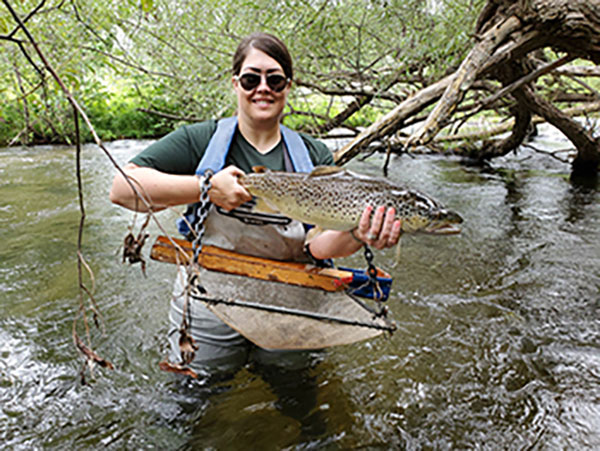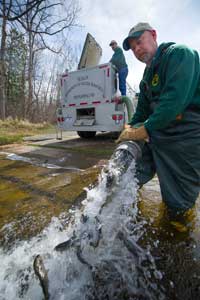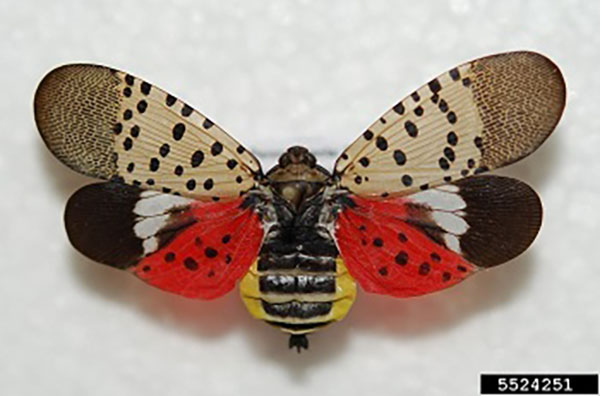- Details
MDNR Report
 Fisheries biologist with trout
Fisheries biologist with trout
The Michigan DNR fisheries management units completed over 260 fisheries surveys across Michigan in 2021. Specifically, DNR fisheries staff surveyed 152 inland lakes and 115 streams.
Overall, the surveys revealed that most of our lakes and streams have healthy, self-sustaining populations of fish.
The surveys are useful for tracking inland fisheries populations, evaluating if stocking increases angler opportunities or addressing concerns from anglers throughout the year.
So, just what are crews looking for?
According to Jay Wesley, DNR Fisheries Division Lake Michigan basin coordinator, surveys fall into three categories:
- Evaluating management actions.
- Understanding status and trends.
- Finding answers to new questions or concerns.
“The management units stepped up last year and safely conducted these surveys to evaluate if management actions, like fish stocking or habitat improvement projects, had the desired effect,” Wesley said. “Surveys help us understand whether or not our management actions resulted in better recreational fishing in certain areas or improved a lake’s overall health.”
- Details
MDNR Report
 Michigan Fish Stocking
Michigan Fish Stocking
Have you seen fish stocking trucks out on the road this spring? We’re in the midst of our spring fish stocking season. This time of year, you’ll find Michigan Department of Natural Resources fish stocking trucks releasing their prized recreational cargo at hundreds of lakes and streams throughout the state.
Fish stocking is a valuable tool used by fisheries managers for different reasons, including:
- Restoring ecosystem balance.
- Providing diverse fishing opportunities.
- Rehabilitating low fish populations.
- Reintroducing extirpated (locally extinct) species.
- Details
MDNR Report
 Lanternfly
Lanternfly
The Michigan Department of Agriculture and Rural Development (MDARD) is asking the public to be on the lookout for spotted lanternfly, an invasive insect with the potential to seriously affect Michigan’s agriculture and natural resources. This insect could damage or kill more than 70 varieties of crops and plants including grapes, apples, hops, and hardwood trees. To date, spotted lanternfly has not been detected in Michigan.
First detected in the United States in 2014 in southeastern Pennsylvania, spotted lanternfly has been spreading rapidly across the northeastern states. There have been confirmed infestations in Connecticut, Delaware, Indiana, Maryland, New Jersey, New York, Ohio, Virginia, and West Virginia.
Spotted lanternfly causes direct damage by sucking sap from host plants and secreting large amounts of a sugar-rich, sticky liquid called honeydew. This honeydew and the resulting black sooty mold can kill plants and foul surfaces. The honeydew often attracts other pests like yellow jackets, flies, and ants, affecting outdoor recreation and complicating crop harvests.
- Details
MDNR Report
The Michigan DNR announced that highly pathogenic avian influenza is now confirmed in the state’s wild bird population. The disease was identified in free-ranging Canada geese and tundra swans from St. Clair County, in snowy owls from Macomb County and in a mute swan from Monroe County. Avian influenza is a virus that can infect both free-ranging and domestic poultry such as chickens, turkeys, quail, geese and swans.Six Canada geese and two tundra swans collected last week at St. Clair Flats State Wildlife Area and two snowy owls from Macomb County were delivered to the DNR's Wildlife Disease Laboratory for necropsy. Initial testing was performed at Michigan State University's Veterinary Diagnostic Lab. These tests were non-negative, and the samples forwarded to the U.S. Department of Agriculture's National Veterinary Services Lab in Ames, Iowa, for final confirmation. The DNR received confirmation Thursday, March 24, the geese, swans and owls were infected with highly pathogenic avian influenza, subtype H5N1. An additional positive case was identified in a mute swan from Monroe County on March 15.
This disease detection comes after the state’s first HPAI detection in a backyard, non-commercial poultry flock in Kalamazoo County in late February 2022. The Michigan Department of Agriculture and Rural Development has continued to urge poultry owners to step up their own biosecurity precautions by minimizing the number of people coming in contact with birds, isolating birds from wild birds whenever possible, and disinfecting hands and clothing after coming in contact with poultry.
- Details
MDNR Report
A Decatur, Michigan man’s unethical hunting activity has resulted in prison time, financial restitution and lifetime loss of hunting privileges in the state. Justin Ernst, 33, pleaded guilty this week in Van Buren County’s 36th Circuit Court.
The story of his arrest was posted in Michiana Outdoors News last November (Read it here).
As part of his plea deal, Ernst was given a lifetime hunting revocation, ordered to pay $25,000 in reimbursement, forfeited all seized items, and will serve 18 months to five years in a Michigan Department of Corrections facility.


